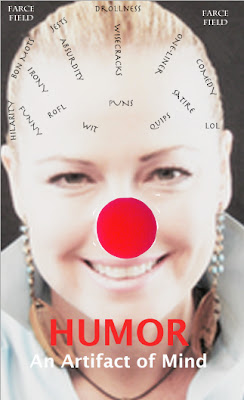Do you like to laugh? Are you high on life? Is laughing one of your most pleasurable experiences? If you answered "Yes" to these questions, most likely you have a good sense of humor and a healthy functioning brain. You may not be a comedian, but you're definitely one of those lighthearted people that other people enjoy being around.
©2009 Sophy Laughing
If you answered "No" to the above questions, you might want to have your head examined by a professional.
So, where is humor in the brain? In a paper published by Joseph M. Moran et al, Neural correlates of humor detection and appreciation, we lean that humor is detected by the left inferior frontal and posterior temporal cortices and appreciated in the bilateral regions of the insular cortex and the amygdala.
For people who laugh easily, life can be pretty funny. These people tend to crack jokes at just the right moment or toss in a witty, lighthearted remark into a conversation before things get too serious. "Down-to-earth" and "warm hearted" or "good natured" are the descriptors given to these people who generally make others feel good with their attempts at being humorous.
But what sorts of things get these people's minds moving? Where do they find the energy to be funny? ...and the material?
For the past 15 months, I have dedicated a significant portion of my time (early mornings, weekends and holidays) to exploring what makes people laugh and have discovered some interesting things.
Essentially, people seem laugh harder at people they like - this includes cute babies, pets, and friends "known for their good humor". Actively sharing humor makes people appear more humorous, which in turn seems to make others more comfortable laughing in their presence. When people expect you to be funny they're already primed to laugh.
In addition to laughing at likeable and funny people, funny videos can send people roaring with laughter on the floor. It's short clips that are the funniest.
A comedy can't be all slapstick, there has to be a plot, theme, and other elements to keep the storyline moving otherwise viewers lose interest quickly. However, place a bunch of 30-second clips back-to-back and people can tune in and laugh for hours at a time.
While humor is definitely subjective, the following categories elicit worldwide laughter: blatant stupidity, ridiculousness, group dancing, cute babies, falling, 80s music videos, and unruly or unexpected behavior.
Laughter also stimulates the brain, which in turn, stimulates thinking and action. After people have laughed freely, they often report the desire to "create something" or "go somewhere and do something."

The ability to appreciate humor is extremely important in social situations. Imagine walking into a party where nobody was laughing? How boring and impersonal would that be? The world would feel like a hospital or court room, somber and depressing. Often times we don't realize how much we depend on the good humor of other people for our own comfort levels.
Humor is also therapeutic, producing a myriad of beneficial psychological and physiological effects on the body (William Fry, 1992, The physiologic effects of humor, mirth, and laughter).
While not as many people are familiar with the writings of Norman Cousins, many understood the health benefits of laughter after watching the movie Patch Adams.
One of the best aspects of exploring humor is that most days you feel as if you're really just fooling around, having fun, or goofing off. Very quickly you're overtaken by the ridiculousness of academia and life in general, and realize that just about any subject is fair game for humorous consideration.
While tragedy is familiar in comedy, it is not humor, per se; it is tragedy dressed up in humorous clothing (like the outfit below).
The next time you want to do your brain a favor, find something to laugh about. Here's one of my favorites...
















No comments:
Post a Comment